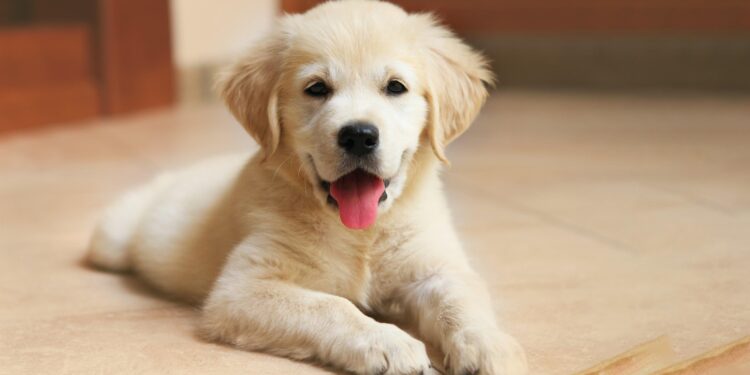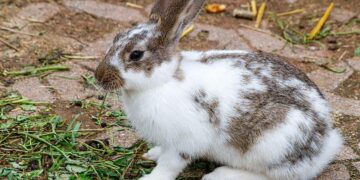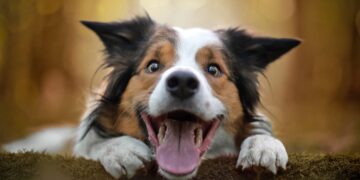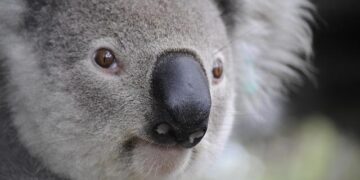Table of Contents
Part 1: The Symphony of Destruction
There is a particular quality to the silence that greets you when you know something has gone terribly wrong.
It is not a peaceful silence.
It is the vacuum left behind by a storm.
For months, this was the silence that met me at my front door, a prelude to what I began calling the Symphony of Destruction.
My dog, a brilliant, high-energy rescue named Buster, was its composer and sole performer.
The performance varied daily, but the themes were consistent.
Some days, the overture was visual: a snowstorm of pillow stuffing blanketing the living room, the skeletal remains of a cushion lying disemboweled on the rug.
Other days, it was olfactory: the sharp, splintered scent of a doorframe that had been worried and gnawed for hours.
The most common motif was the destruction of household objects—a single, forlorn-looking shoe, a television remote control reduced to a mosaic of plastic shards, the deep, frantic teeth marks gouged into the leg of an antique writing desk.1
These were not random acts of mischief; they were classic, textbook symptoms of a profound distress that afflicts countless dogs: a potent cocktail of boredom and separation anxiety.3
My initial response was a frantic cycle of failed solutions, a litany familiar to any struggling dog owner.
More exercise, I thought.
A tired dog is a good dog.
Our walks became grueling marches, our games of fetch marathon sessions that left me exhausted but seemed only to wind him up further, like a spring coiled ever tighter.
I bought a mountain of plush toys, each one promising durability, each one disemboweled within minutes, their squeakers surgically removed and discarded like trophies.6
I tried scolding, pointing a stern finger at the evidence upon my return, an act of pure futility.
Animal behaviorists have long understood that punishment administered after the fact is meaningless to a dog; it only serves to create anxiety around the owner’s presence, potentially making the underlying problem worse.7
The behaviors were not just a nuisance; they were a language I couldn’t understand.
The shredded couch was not an act of rebellion but a desperate, misdirected attempt at work.
The incessant barking reported by my neighbors was not a cry for attention, but a symptom of deep-seated anxiety that peaked in the first 20 minutes after I left.1
I was witnessing a creature actively, albeit destructively, trying to solve its own problem.
Buster wasn’t just passively bored; he was on a frantic, self-assigned mission to find stimulation, to self-soothe, to expend a vast reservoir of mental and physical energy that had no productive outlet.2
The destruction was not the problem; it was his flawed solution.
He was communicating his distress in the only way he knew how, and I was failing to listen.
Part 2: The Misdiagnosis: Confusing Energy with Malice
In the depths of my frustration, I fell prey to the most common of human errors: I began to anthropomorphize.
I constructed a narrative of intent, a story that cast Buster as a vengeful actor and me as his victim.
“He’s doing this to get back at me for leaving,” I would mutter, surveying the wreckage.
“He knows he’s been bad; look at how guilty he acts.” This interpretation, however, is a fundamental misreading of canine psychology.
The “guilty look”—the lowered head, the averted eyes, the tucked tail—is not an admission of wrongdoing but a complex series of appeasement signals in response to an owner’s angry posture and tone.7
Buster wasn’t feeling guilt; he was feeling fear.
My attempts to discipline him were based on a human-centric model of justice that had no place in our interspecies relationship.
I was trying to impose more rules, more control, believing the issue was a lack of discipline.
This approach is akin to trying to fix a software bug by shouting at the computer.
The problem wasn’t a lack of rules, but a profound lack of meaning in his life.
Many dog breeds, especially a mix like Buster’s, have been shaped by centuries of selective breeding for specific, complex tasks—herding, hunting, guarding.9
They are creatures hardwired for purpose.
To expect such an animal to be content with a few leash walks and long hours of inactivity is to ignore its very nature.10
The epiphany began to dawn: Buster’s destructive behavior was not a moral failing.
It was the canine equivalent of a brilliant, unfulfilled employee causing trouble in the office out of sheer boredom.
He was suffering from a kind of existential ennui, a crisis of purpose.
He didn’t need more scolding or stricter rules.
He needed a job.11
The challenge, then, was to figure out what kind of work one offers a dog in a modern apartment.
I couldn’t give him a flock of sheep to herd or a field to hunt, but I had to find a way to engage the powerful cognitive machinery that was currently being used to deconstruct my furniture.
The solution, I would discover, was not about adding more discipline, but about providing a project that engaged his unique skills, satisfied his deepest instincts, and channeled his intelligence into a focused, fulfilling task.
Part 3: The Epiphany: It’s Not a Toy, It’s a Game Engine
The breakthrough came in the form of a strange, red, snowman-shaped rubber object that had been recommended to me countless times: the KONG Classic.
At first, I was skeptical.
It looked like just another toy destined for the graveyard of shredded playthings.
But my research led me down a rabbit hole, away from product reviews and into the worlds of animal psychology, behavioral science, and, unexpectedly, video game design.
I realized the KONG was not a toy at all.
It was a perfectly engineered game engine, a sophisticated psychological tool designed to solve the very problem of purpose that was plaguing my dog.
The foundation of this understanding is the concept of canine enrichment.
For decades, animal welfare experts have emphasized that an animal’s well-being depends on more than just food, water, and shelter.
They require opportunities to engage in species-typical behaviors that stimulate their minds, bodies, and senses.12
For a dog, this means activities that tap into their natural instincts to sniff, chew, play, and problem-solve.15
Providing enrichment is not a luxury; it is a biological necessity that reduces stress, prevents behavioral problems, and promotes overall health.12
Food-based enrichment, which requires an animal to work for its meals, is particularly powerful because it mimics the natural behavior of hunting and foraging.13
This led me to the psychological mechanism behind the KONG’s effectiveness: the concept of “flow state.” Coined by psychologist Mihaly Csikszentmihalyi, flow describes a state of complete immersion in an activity, where one is so focused and engaged that the outside world seems to fade away.19
It’s that feeling of being “in the zone,” and it is intrinsically rewarding, leading to feelings of competence and happiness.21
While flow has been studied extensively in humans, researchers are now exploring how a similar state in animals could be a key indicator of positive welfare.23
An animal in a state of flow is not bored or anxious; it is deeply engaged in a task that is challenging but achievable.
This is where the KONG’s genius as a game engine becomes clear.
It masterfully employs the core principles of engaging game design to induce a flow state in dogs 26:
- A Clear Goal: The objective is simple and intuitive: get the food out. This provides a clear focus for the dog’s efforts.28
- An Immediate Feedback Loop: Every lick, chew, or nudge that successfully dislodges a piece of food provides immediate positive reinforcement. This creates a satisfying loop: action leads to reward, which encourages another action. This process keeps the dog motivated and engaged, preventing them from giving up.26
- A Balanced and Scalable Difficulty Curve: This is the KONG’s most brilliant feature. The challenge is not static. For a beginner, the “game” can be set to an easy tutorial level (e.g., loose kibble that falls out with minimal effort). For an experienced “player,” the difficulty can be ramped up to a legendary boss level (e.g., complex layers of different foods, packed tightly and frozen solid). This scalability is crucial because it allows the owner to find the perfect balance for their dog, avoiding the two enemies of flow: boredom (if the task is too easy) and frustration (if it’s too hard).27
By engaging a dog in this well-designed “game,” the KONG provides the meaningful work Buster had been craving.
It channels his instinctual drive to forage and problem-solve into a productive, focused task.18
Research has even shown that many animals exhibit “contrafreeloading,” a preference to work for their food even when identical food is freely available, suggesting the problem-solving process itself is inherently rewarding.24
The KONG wasn’t just a distraction; it was a therapeutic tool for teaching self-regulation.
By providing a long-lasting, rewarding, and calming activity, it helped him associate being alone with a positive experience, effectively rewiring the anxious response that led to the Symphony of Destruction.3
Part 4: Leveling Up: Choosing Your Character’s Class and Gear
Understanding the theory behind the KONG was one thing; putting it into practice was another.
The sheer variety of products was daunting.
To navigate this, I continued my gaming analogy, reframing the selection process as gearing up a character for an epic adventure.
Every dog is a different “character class,” with unique stats and abilities, and choosing the right KONG is like selecting the perfect piece of gear for their playstyle.
The KONG Armory: A Guide to Gearing Up
The most critical choice is the KONG’s material, which is helpfully color-coded.
This determines its durability and is directly tied to your dog’s “class.”
- The Squire (Puppy Class): For young puppies up to nine months old, the journey begins with the soft, pliable rubber of the KONG Puppy, available in pink and blue. This material is specifically designed to be gentle on developing teeth and gums, providing a soothing outlet during the painful teething phase while teaching appropriate chewing habits from the start.3
- The Adventurer (Classic Class): This is the class for most adult dogs. The iconic red KONG Classic is made from a durable, all-natural rubber that satisfies the chewing instincts of the average dog. It’s the versatile, all-purpose choice for the majority of players.34
- The Sage (Senior Class): For older dogs whose chewing force has softened with age, the purple KONG Senior offers a gentler but still engaging experience. Its customized rubber formula caters to the needs of aging teeth and jaws, ensuring enrichment remains a comfortable and enjoyable part of their golden years.34
- The Barbarian (Extreme Class): This is the class for the true power chewers, the dogs who view every other toy as a personal challenge to be conquered and destroyed. The black KONG Extreme is forged from the company’s most durable rubber compound, engineered to withstand the most tenacious jaws. For breeds known for their bite strength, this is often the only piece of gear that can survive the battle.34
The ‘Level Requirement’: Non-Negotiable Sizing for Safety
Just as a character in a game cannot wield a weapon above their level, a dog must never be given a KONG that is too small for them.
This is not a suggestion; it is a critical safety rule.
A KONG that is too small can become a serious choking hazard or, if swallowed, can cause a life-threatening intestinal blockage.36
The company provides clear weight-based guidelines for each size, from X-Small to XX-Large.34
Heed the most important piece of advice from veterinarians, trainers, and seasoned owners alike:
when in doubt, size up.37
User forums are filled with harrowing cautionary tales of emergency surgeries required to remove lodged KONGs, a terrifying and expensive consequence of improper sizing.36
Game Modes: Choosing the Right Shape for the Quest
Beyond the classic snowman shape, KONG offers a variety of forms that can be thought of as different “game modes,” each offering a unique challenge.
- Classic Campaign (KONG Classic): The original and most versatile puzzle-solver, perfect for stuffing and unpredictable bouncing during fetch.34
- Side Quests (KONG Goodie Bone & Goodie Ribbon): These bone-shaped toys feature patented “Goodie Grippers”—special slots designed to hold treats or pastes, offering a different kind of extraction challenge that encourages focused chewing.34
- Multiplayer Mode (KONG Tug): Designed with comfortable grips for both human and dog, this toy is built for interactive games of tug-of-war, strengthening the bond between you and your canine companion.34
- Water Levels (KONG Aqua): For dogs who love to swim, this version of the Classic floats and includes a rope for easy throwing and retrieval, making it the perfect toy for aquatic adventures.34
To simplify these crucial choices, the following table aligns each dog “class” with the appropriate gear.
| Dog ‘Class’ | Player Profile | KONG Model | Color/Material | Primary ‘Game’ |
| The Squire | Teething Puppies (up to 9 mos) | KONG Puppy | Pink/Blue (Soft Rubber) | Soothing Gums, Intro Puzzles |
| The Adventurer | Most Adult Dogs | KONG Classic | Red (Classic Rubber) | Foraging & Puzzle Solving |
| The Barbarian | Power Chewers | KONG Extreme | Black (Extreme Rubber) | Durability Challenge |
| The Sage | Senior Dogs | KONG Senior | Purple (Senior Rubber) | Gentle Chewing & Enrichment |
Part 5: Mastering the Game: The Art of the ‘Quest’ Design
With the right gear selected, I transitioned from player to “game designer.” The true, long-lasting magic of the KONG lies not in the object itself, but in the art of the stuff—the “quests” you design for your dog.
A poorly designed quest can lead to boredom or frustration, but a well-designed one can provide an extended period of blissful, focused flow.
The key is to gradually increase the difficulty, allowing your dog to level up their skills over time.30
The Difficulty Tiers: From Tutorial to Legendary Raid
This progression is designed to build your dog’s confidence and perseverance.
Skipping ahead to the hardest level is a common mistake that can cause a dog to give up entirely.30
- Level 1: The Tutorial. Fill the KONG loosely with your dog’s dry kibble or small treats that fall out easily. The goal here is simple: teach the dog that interacting with the object yields rewards. This builds a positive association and demonstrates the basic game mechanic.30
- Level 2: Easy Mode. Fill the KONG about three-quarters of the way with kibble. Then, use a “plug” of something sticky—like wet dog food, plain canned pumpkin, or plain yogurt—to seal the large opening. This requires the dog to work through the sticky layer to get to the loose goodies inside.30
- Level 3: Normal Mode. Prepare a Level 2 KONG, but this time, place it in the freezer for a few hours. The frozen plug introduces a new challenge and significantly extends the playtime, requiring persistent licking to melt the seal.3
- Level 4: Hard Mode. Create a mixture of your dog’s wet and dry food and pack it tightly into the KONG. The dense, uniform texture means there are no “easy wins”; every morsel has to be worked for.30
- Level 5: The Legendary Raid. Prepare a Level 4 KONG and freeze it solid overnight. This is the ultimate challenge, a long-lasting canine popsicle that can keep even the most determined dog occupied for 45 minutes or more. It is the perfect quest to deploy when you need a guaranteed period of quiet engagement, such as when you’re leaving the house or have guests over.30
A Curated Recipe Book for the Aspiring Quest Designer
Moving beyond the standard peanut butter (which should always be xylitol-free and used in moderation due to its high calorie count) opens up a world of healthy and creative possibilities.40
Here are three of my go-to recipes:
- The Forager’s Feast (Beginner/Intermediate): This recipe creates interesting textures and layers.
- Ingredients: Your dog’s kibble, baby carrots, small chunks of apple, a tablespoon of low-fat cream cheese.
- Instructions: Drop a few pieces of kibble into the KONG. Add a baby carrot or two. Add a few more pieces of kibble, then some apple chunks. Repeat until the KONG is nearly full. Seal the large opening with the cream cheese. Serve fresh for an easier challenge or frozen for a longer-lasting one.38
- Designer’s Note: The varied shapes and sizes of the ingredients create a more dynamic puzzle than a simple paste.
- The Soothing Smoothie (Intermediate, Frozen): A fantastic option for hot days or for dogs with sensitive stomachs.
- Ingredients: Plain, unsweetened Greek yogurt, a handful of blueberries, half a mashed banana.
- Instructions: In a bowl, mix the yogurt, blueberries, and mashed banana. To prevent leaks while freezing, plug the small hole at the bottom of the KONG with a dab of cream cheese or peanut butter. Spoon the mixture into the KONG and freeze solid for at least 4-6 hours.40
- Designer’s Note: The probiotics in yogurt are great for gut health, and the frozen consistency is incredibly satisfying for dogs to lick.
- The Thanksgiving Dinner (Advanced, Frozen): A high-value, savory reward for special occasions or for the seasoned KONG expert.
- Ingredients: Plain canned pumpkin (ensure it’s 100% pumpkin, not pie filling), shredded cooked chicken or turkey (unseasoned), a few unsweetened dried cranberries.
- Instructions: Mix all ingredients in a bowl. Pack the mixture tightly into the KONG, plugging the small hole first. Freeze solid.40
- Designer’s Note: This combination is highly aromatic and irresistible to most dogs, making it a powerful tool for creating a positive association with potentially stressful situations, like being left alone.
A few pro-tips can streamline the process.
Prepare a week’s worth of KONGs at once and store them in a freezer bag for grab-and-go enrichment.36
And for cleanup, a simple bottle brush and warm, soapy water work wonders, or you can simply place the KONG on the top rack of your dishwasher.3
Part 6: Conclusion: The Sound of Silence (and Purposeful Licking)
The transformation was not instantaneous, but it was profound.
The silence that greets me at my front door now is a different kind entirely.
It is a true and peaceful quiet, punctuated only by the faint, rhythmic sound of Buster in his crate, diligently working on his “job.” The frantic, anxious energy that once fueled a symphony of destruction has been channeled into a quiet, focused hum of activity.
The sound of his tongue working away at a frozen concoction of pumpkin and chicken is the sound of a fulfilled animal, a creature whose cognitive and instinctual needs are finally being M.T. It is the sound of a quiet mind—his and, by extension, mine.
The KONG was not a magic wand.
It did not “fix” a “bad dog.” Rather, it was a key that unlocked a new paradigm in my relationship with him.
It forced me to shift my perspective from one of management and control to one of understanding and fulfillment.
The problem was never a lack of obedience, but a lack of opportunity.
Buster didn’t need to be corrected; he needed to be challenged.
He needed a task worthy of his intelligence.
In providing him with that task, I learned the most important lesson of animal companionship: our dogs are not just passive recipients of our affection.
They are complex beings with rich inner lives and deep-seated needs for more than just food and shelter.
They need purpose.
By recognizing and honoring that need, we do more than just solve behavioral problems.
We forge a deeper, more resilient bond built on a foundation of mutual respect and understanding.21
The red rubber snowman on my floor is more than a toy; it is a daily reminder that the path to a harmonious life with our dogs is not through dominance, but through empathy, and that sometimes, the greatest gift we can give them is a good day’s work.
Works cited
- Separation Anxiety | ASPCA, accessed August 17, 2025, https://www.aspca.org/pet-care/dog-care/common-dog-behavior-issues/separation-anxiety
- Destructive Chewing | ASPCA, accessed August 17, 2025, https://www.aspca.org/pet-care/dog-care/common-dog-behavior-issues/destructive-chewing
- About KONG Toys | Pet Enrichment, accessed August 17, 2025, https://www.kongcompany.com/about-kong-toys/
- Separation Anxiety in Dogs | VCA Animal Hospitals, accessed August 17, 2025, https://vcahospitals.com/know-your-pet/separation-anxiety-in-dogs
- Problem Behaviors – Dog Chewing – Carolina Veterinary Specialists Matthews, accessed August 17, 2025, https://www.matthews.carolinavet.com/site/pet-health-blog/2021/03/15/how-to-stop-dog-from-chewing
- Has anyone used Kong stuffed toys? : r/puppy101 – Reddit, accessed August 17, 2025, https://www.reddit.com/r/puppy101/comments/1gwto26/has_anyone_used_kong_stuffed_toys/
- Explaining Destructive Behavior in Dogs – MSPCA-Angell, accessed August 17, 2025, https://www.mspca.org/pet_resources/explaining-destructive-behavior-in-dogs/
- Behavior Challenges: Destructive Chewing – San Diego Humane Society, accessed August 17, 2025, https://resources.sdhumane.org/Resource_Center/Behavior_and_Training/Dogs_and_Puppies/Behavior_Challenges/Behavior_Challenges%3A_Destructive_Chewing
- Does Your Dog Have A Job? – Wilderness Animal Hospital, accessed August 17, 2025, https://wildernessvet.com/september-2011-does-your-dog-have-a-job/
- Do Dogs Need a Job? – The Other End of the Leash – Patricia McConnell, accessed August 17, 2025, https://www.patriciamcconnell.com/theotherendoftheleash/do-dogs-need-a-job
- Rethinking the Notion: “That Dog Needs a Job!” – Chateau Canine LLC, accessed August 17, 2025, https://chateaucaninellc.com/rethinking-the-notion-that-dog-needs-a-job/
- Why is enrichment important for dogs? – RSPCA Knowledgebase, accessed August 17, 2025, https://kb.rspca.org.au/knowledge-base/why-is-enrichment-important-for-dogs/
- Enrichment ideas for dogs – Guide Dogs, accessed August 17, 2025, https://www.guidedogs.org.uk/getting-support/information-and-advice/dog-care-and-welfare/dog-enrichment-ideas/
- The role of enrichment for dogs during enforced confinement – Veterinary Practice, accessed August 17, 2025, https://www.veterinary-practice.com/article/role-enrichment-dogs-during-enforced-confinement
- Canine Enrichment – Anti-Cruelty Society, accessed August 17, 2025, https://anticruelty.org/pet-library/canine-enrichment
- Effects of Environmental Enrichment on Dog Behaviour: Pilot Study – PMC, accessed August 17, 2025, https://pmc.ncbi.nlm.nih.gov/articles/PMC8772568/
- The Benefits of Mental Stimulation for Your Dog’s Well-Being | Oncotect, accessed August 17, 2025, https://oncotect.co/blogs/resources/the-benefits-of-mental-stimulation-for-your-dogs-well-being
- Behavior Management: Enrichment and Foraging Toys – VCA Animal Hospitals, accessed August 17, 2025, https://vcahospitals.com/know-your-pet/behavior-management—enrichment-and-activity-toys
- Finding ‘Flow’ in dog training : A Journey Beyond the Ordinary – Simon Prins, accessed August 17, 2025, https://www.simonprins.com/finding-flow-in-dog-training-a-journey-beyond-the-ordinary/
- Accessing the Flow State, accessed August 17, 2025, https://animalflow.com/flowist_post/the-flow-state/
- How play strengthens your child’s mental health | UNICEF Parenting, accessed August 17, 2025, https://www.unicef.org/parenting/child-development/how-play-strengthens-your-childs-mental-health
- The Power of Play | Psychology Today, accessed August 17, 2025, https://www.psychologytoday.com/us/blog/relationship-based-parenting/202402/the-power-of-play
- In the Zone: Towards a Comparative Study of Flow State in Primates – University of Bristol, accessed August 17, 2025, https://research-information.bris.ac.uk/en/publications/in-the-zone-towards-a-comparative-study-of-flow-state-in-primates
- In the Zone: Towards a Comparative Study of Flow State in Primates | Animal Behavior and Cognition, accessed August 17, 2025, https://www.animalbehaviorandcognition.org/uploads/journals/51/4%20Clark_ABC_10(1).pdf
- Animals in flow – Towards the scientific study of intrinsic reward in animals – ResearchGate, accessed August 17, 2025, https://www.researchgate.net/publication/357189054_Animals_in_flow_-_Towards_the_scientific_study_of_intrinsic_reward_in_animals
- The Psychology of Game Design: How to Keep Players Engaged – Buildbox, accessed August 17, 2025, https://www.buildbox.com/the-psychology-of-game-design-how-to-keep-players-engaged/
- How Game Design Principles Drive Player Engagement | CG Spectrum, accessed August 17, 2025, https://www.cgspectrum.com/blog/game-design-principles-player-engagement
- Game Design Principles: A Comprehensive Guide to Creating Memorable Experiences, accessed August 17, 2025, https://www.sonamine.com/blog/game-design-principles-a-comprehensive-guide-to-creating-memorable-experiences
- Kong Stuffing Recipe | Guide Dogs for the Blind, accessed August 17, 2025, https://www.guidedogs.com/resources/client-resources/k9-buddy-curriculum/kong-stuffing-recipe
- Enrichment: Kong Stuffing Pointers – San Diego Humane Society, accessed August 17, 2025, https://resources.sdhumane.org/Resource_Center/Behavior_and_Training/Dogs_and_Puppies/Enrichment%3A_Brain_Games_for_Mental_Health/Enrichment%3A_Kong_Stuffing_Pointers
- Motivational Factors Underlying Problem Solving: Comparing Wolf and Dog Puppies’ Explorative and Neophobic Behaviors at 5, 6, and 8 Weeks of Age – Frontiers, accessed August 17, 2025, https://www.frontiersin.org/journals/psychology/articles/10.3389/fpsyg.2017.00180/full
- Do Working Dogs Really Want to Work? — Mobility Service Dog – West Coast Project, accessed August 17, 2025, https://mobilitydog.org/blog-about-mobility-service-dogs-and-their-ada-handlers/2023/12/6/do-working-dogs-really-want-to-work
- Are kongs the best chew toy like so many websites say or does the kong brand just have really well covered product placement? : r/puppy101 – Reddit, accessed August 17, 2025, https://www.reddit.com/r/puppy101/comments/beisdu/are_kongs_the_best_chew_toy_like_so_many_websites/
- KONG | Dog Toys, Cat Toys, and Treats, accessed August 17, 2025, https://www.kongcompany.com/
- KONG: Dog & Cat Toys (Free Shipping) – Chewy, accessed August 17, 2025, https://www.chewy.com/brands/kong-6981
- Is there a risk in getting too-small Kong Classic? : r/dogs – Reddit, accessed August 17, 2025, https://www.reddit.com/r/dogs/comments/1g2lzn3/is_there_a_risk_in_getting_toosmall_kong_classic/
- Kong Classic Dog Toys – Clean Run, accessed August 17, 2025, https://www.cleanrun.com/product/kong_classic_dog_toys/index.cfm
- Kong Stuffing Recipes, accessed August 17, 2025, https://www.pspca.org/sites/default/files/attachments/2017-07/Kong-Stuffing-Recipes.pdf
- Kong Stuffing 101 – San Diego Humane Society – YouTube, accessed August 17, 2025, https://m.youtube.com/watch?v=lk5I-p10C7Y&t=18s
- 13 Kong Filler Recipes – Stuff Your Kong for Puppies & Adult Dogs – SpiritDog Training, accessed August 17, 2025, https://spiritdogtraining.com/training/kong-stuffing-recipes/
- Easy Kong Filling for DIY Treats – Wag n Tails – Dog Training & Enrichment, accessed August 17, 2025, https://wagntails.net/2021/04/30/easy-kong-fillings-for-diy-dog-treats/
- What Can You Put in a KONG Besides Peanut Butter?, accessed August 17, 2025, https://www.kongcompany.com/what-can-you-put-in-a-kong-besides-peanut-butter/
- KONG Stuffing Recipes – Pet Care Tips, accessed August 17, 2025, https://spca.org/file/KONG-Stuffing-Recipes.pdf
- Give me all your Kong stuffing ideas!!! : r/puppy101 – Reddit, accessed August 17, 2025, https://www.reddit.com/r/puppy101/comments/ooq9mf/give_me_all_your_kong_stuffing_ideas/
- Kong Stuffing Ideas | Dog Trick Academy Forum, accessed August 17, 2025, https://www.dogtrickacademy.com/forum/threads/kong-stuffing-ideas.4023/
- Positive Training, accessed August 17, 2025, https://positively.com/dog-training/article/philosophy-positive-training






